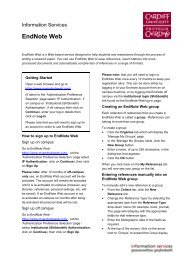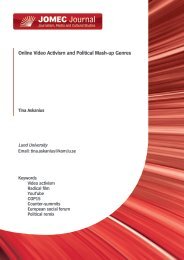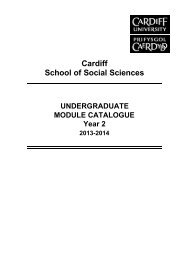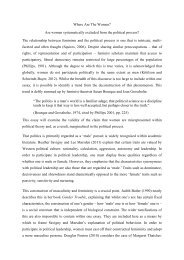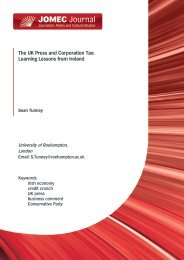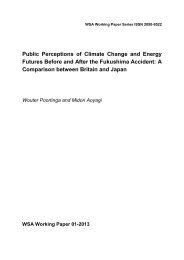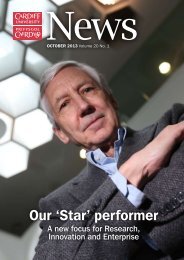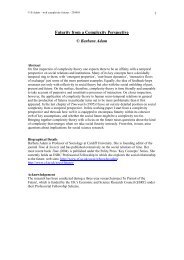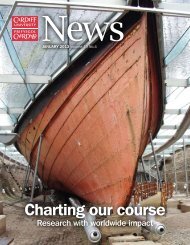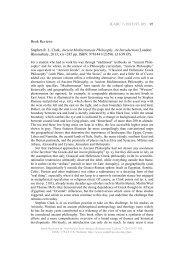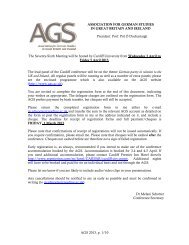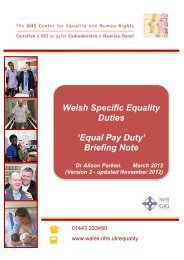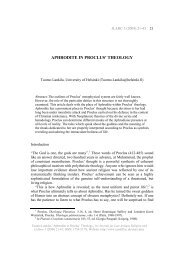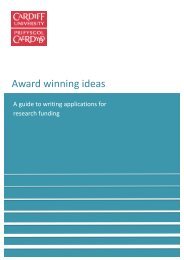Effectiveness Review of Council 2013 - Cardiff University
Effectiveness Review of Council 2013 - Cardiff University
Effectiveness Review of Council 2013 - Cardiff University
You also want an ePaper? Increase the reach of your titles
YUMPU automatically turns print PDFs into web optimized ePapers that Google loves.
12/710<br />
EFFECTIVENESS REVIEW OF COUNCIL <strong>2013</strong>: REPORT TO COUNCIL<br />
1. Introduction<br />
1.1 The <strong>University</strong> is undergoing a period <strong>of</strong> major change – there is a new Vice<br />
Chancellor, a relatively new Chair <strong>of</strong> <strong>Council</strong> and a new triumvirate <strong>of</strong><br />
Colleges with their designated PVCs, as well as 3 cross cutting PVCs and a<br />
new pr<strong>of</strong>essional services arrangement is in place to support both the needs<br />
<strong>of</strong> the Colleges and those <strong>of</strong> the corporate university. It is therefore difficult to<br />
predict with certainty all the nuances <strong>of</strong> inter-connected governance that will<br />
result from these changes. There is a healthy air <strong>of</strong> determination and<br />
ambition with the new leadership team. This is appreciated and welcome but<br />
there must also be appropriate levels <strong>of</strong> management accountability to<br />
<strong>Council</strong>. There is a duty on the <strong>Council</strong> to ensure that the emerging strategy<br />
is appropriate for the <strong>University</strong>’s ambition, is being effectively delivered, that<br />
the quality <strong>of</strong> the institutional performance is seen to be improving and that<br />
there is clear connect with the <strong>Council</strong> and its sub committees in order to<br />
ensure maximum efficiency and effectiveness.<br />
1.2 Overall, the outcome <strong>of</strong> the <strong>Review</strong> indicates few extremes <strong>of</strong> either excellent<br />
or poor practice. Therefore, the recommendations made in this Report are<br />
more in the nature <strong>of</strong> improving or refining practice rather than radical change.<br />
1.3 There is a clear sense that the <strong>University</strong> is poised to move into a new period<br />
<strong>of</strong> development, there is an appetite for managed risk but this must come with<br />
the concomitant expectation <strong>of</strong> rigorous scrutiny and constructive challenge at<br />
<strong>Council</strong> level.<br />
2. Background and scope <strong>of</strong> review<br />
2.1 <strong>Council</strong>, in December 2012, invited Mrs Fiona Peel to lead the review <strong>of</strong><br />
effectiveness which <strong>Council</strong> had committed itself to undertaking during<br />
2012/13.<br />
2.2 Mrs Peel was also given authority by <strong>Council</strong> to determine both the format <strong>of</strong><br />
the review and the extent <strong>of</strong> external involvement in its conduct. The<br />
Leadership Foundation’s (LFH E) Framework for Identifying Governing Body<br />
<strong>Effectiveness</strong> (2011) has provided a useful basis for the conduct <strong>of</strong> the<br />
review. Following a meeting with Mrs Peel on 18 December 2012 it was<br />
agreed that in addition to assessing the operation <strong>of</strong> the <strong>Council</strong> itself the<br />
review should also cover the functioning and effectiveness <strong>of</strong> <strong>Council</strong>’s subcommittees.<br />
However, it was agreed that the review would not look in detail<br />
at those committees where there was an externally driven (mainly HEFCW)<br />
requirement such as applied in the Audit and Remuneration Committees or<br />
those committees which were primarily academic, except it was judged that<br />
<strong>Council</strong>’s relationship with Senate might usefully be given some coverage.<br />
2.3 It was also agreed that in assessing overall effectiveness the impact <strong>of</strong> current<br />
changes, in particular the establishment <strong>of</strong> Colleges, would need to be taken<br />
into account, even though that impact has yet to be firmly established. There<br />
was also a need to ensure that the <strong>University</strong>’s status as a registered charity,<br />
and the role <strong>of</strong> <strong>Council</strong> members as charity trustees, was appropriately<br />
considered.<br />
2.4 The Chair <strong>of</strong> <strong>Council</strong> subsequently invited Mrs Peel, in parallel with this<br />
review, formally to assess the impact <strong>of</strong> the changes to the Committee<br />
structure which were put into place in 2011/12, including the establishment <strong>of</strong><br />
1
12/710<br />
the policy networks. This was in line with a commitment to review that was<br />
entered into at the time these changes were approved in July 2011.<br />
3. Working Method<br />
3.1 It was decided that the review would be conducted by means <strong>of</strong> the following:<br />
<br />
<br />
<br />
Consultation with other universities/bodies who have conducted recent<br />
effectiveness reviews.<br />
A structured survey <strong>of</strong> members.<br />
Specific consultation with Chair <strong>of</strong> <strong>Council</strong> and Vice-Chancellor.<br />
3.2 Feedback from the Chair <strong>of</strong> <strong>Council</strong> following his one-to-one meetings with<br />
<strong>Council</strong> members was also considered as part <strong>of</strong> the <strong>Review</strong>.<br />
4. Consultation with other universities<br />
4.1 Mrs Peel, supported by Dr Chris Turner and Sharon Orton, has met with:<br />
Richard Walters, Clerk to the Governors, <strong>Cardiff</strong> Metropolitan <strong>University</strong> (5<br />
February <strong>2013</strong>).<br />
Mark Humphriss, <strong>University</strong> Secretary, Bath <strong>University</strong> (12 April <strong>2013</strong>).<br />
4.2 Both these meetings produced useful insights into the conduct and the<br />
outcomes <strong>of</strong> periodic effectiveness reviews. <strong>Cardiff</strong> Metropolitan <strong>University</strong><br />
was one <strong>of</strong> the pilot institutions for developing the LFHE framework and was<br />
therefore able to provide information on which elements <strong>of</strong> the very detailed<br />
framework document were most helpful. In addition to learning about the<br />
approach used at the <strong>University</strong> <strong>of</strong> Bath Mark Humphriss’s experience as an<br />
Independent Assessor for Swansea <strong>University</strong>’s effectiveness review was<br />
useful in determining whether such an approach would be beneficial for<br />
<strong>Cardiff</strong> <strong>University</strong>.<br />
4.3 Mrs Peel decided that it was not necessary to engage an independent<br />
assessor for the review. In her judgement the primary benefit <strong>of</strong> such an<br />
assessor was to allow members to convey their views with freedom but that at<br />
<strong>Cardiff</strong> the experience was that the <strong>Council</strong> members had already been<br />
forthcoming with their views and the fact that Mrs Peel herself would be<br />
stepping down from <strong>Council</strong> shortly was seen as helpful in ensuring that<br />
members did not feel constrained in providing their views. Bath <strong>University</strong>’s<br />
approach to effectiveness reviews <strong>of</strong> both <strong>Council</strong> and <strong>of</strong> Senate was also<br />
instructive in suggesting that it would be helpful to focus on a set <strong>of</strong> key<br />
outcomes (around 10) that would add value to the work <strong>of</strong> those bodies rather<br />
than a multiplicity <strong>of</strong> relatively minor adjustments to process.<br />
5. Survey <strong>of</strong> <strong>Council</strong> members<br />
5.1 The survey <strong>of</strong> <strong>Council</strong> members and <strong>of</strong>ficers was launched on 11 March <strong>2013</strong><br />
and a reminder sent to recipients on 25 March. The working group wishes to<br />
thank all respondents (24) and those interviewed individually. Twenty four<br />
responses were received:<br />
2
12/710<br />
Lay Member 12<br />
Ex <strong>of</strong>ficio academic member 3<br />
Senate Member 3<br />
Staff Member <strong>of</strong> <strong>Council</strong> 2<br />
Student Member 1<br />
Officer 3<br />
5.2 In addition, Mrs Peel met with the following members <strong>of</strong> <strong>Council</strong>:<br />
John Jeans<br />
Vice-Chancellor<br />
Roy Evans<br />
Walter Gear<br />
Ricardo Calil<br />
Daniel Hodgson<br />
Harry Newman and Beth Button.<br />
6. <strong>Review</strong> Findings<br />
6.1 Overall the responses to the questions indicated few extremes <strong>of</strong> either<br />
excellent or poor practice. Therefore the recommendations that flow from the<br />
survey and the other sources <strong>of</strong> information, including the interviews with<br />
individuals, are more in the nature <strong>of</strong> improvements or refinements to practice<br />
rather than radical change. A detailed report <strong>of</strong> the responses is attached as<br />
Appendix 1.<br />
6.2 Notably, all <strong>Council</strong> members appreciated their one to one meetings with the<br />
Chair <strong>of</strong> <strong>Council</strong> as they felt that this enabled them to discuss their personal<br />
contribution and effectiveness, to receive feedback and provided an<br />
opportunity to discuss their development needs.<br />
Recommendation 1 - annual one to one meetings with the Chair <strong>of</strong><br />
<strong>Council</strong> to be continued as one way <strong>of</strong> ensuring individual effectiveness.<br />
6.3 The <strong>Review</strong> found that there were no major concerns raised in relation to the<br />
following areas:<br />
.1 There was general consensus that there is diversity <strong>of</strong> skills amongst<br />
<strong>Council</strong> members - this will be enhanced by the Chair’s proposal to ask the<br />
<strong>University</strong>’s recruitment agents to find a pool <strong>of</strong> talented people with a<br />
defined skill set who may be recruited (or retained for a period <strong>of</strong> time)<br />
rather than having to undertake individual searches as each vacancy<br />
arises.<br />
.2 The quality <strong>of</strong> report writing - the responses indicated that reports were<br />
generally clear and relevant.<br />
.3 The length and number <strong>of</strong> meetings - responses indicated that relevant<br />
business could be conducted within the set timeframe and number <strong>of</strong><br />
meetings.<br />
.4 The Chair <strong>of</strong> <strong>Council</strong> indicated, at the May <strong>2013</strong> <strong>Council</strong> meeting, a<br />
preference to spread the dates <strong>of</strong> the meetings more evenly across the<br />
3
12/710<br />
year so that there is not a long gap after July. He has also asked the<br />
members to consider changing the time <strong>of</strong> meetings - to move them from<br />
5pm to an afternoon slot as this would be fairer for staff to work within<br />
normal working hours. Feedback received so far indicates that there are<br />
relatively few objections to <strong>Council</strong> meetings commencing at 2pm.<br />
Recommendation 2 - to review dates for <strong>Council</strong> meetings to fit within<br />
the cycle <strong>of</strong> committee meetings and annual requirements such as<br />
annual accounts.<br />
.5 Generally there is not a problem with timeliness <strong>of</strong> papers; they are<br />
distributed about a week before the meetings, but occasionally some arrive<br />
just two days ahead <strong>of</strong> the meeting. This should be avoided or regarded as<br />
exceptional and sent only with the Chair’s approval.<br />
.6 Members felt that they received reasonable assurance on financial health,<br />
on student experience, on research quality and ambition, that risk<br />
management is in place, and that there is clear accountability for delivery<br />
<strong>of</strong> the <strong>University</strong> strategy.<br />
.7 The Way Forward strategic document has been widely welcomed and<br />
supported by nearly everyone as an understandable and succinct<br />
document that clearly encapsulates the ambition <strong>of</strong> the <strong>University</strong> for the<br />
next five years. Members also approved <strong>of</strong> the clear KPIs that have been<br />
outlined in that document.<br />
Recommendation 3 - that the performance achieved against KPIs<br />
identified in the Way Forward document should be presented to <strong>Council</strong><br />
at least annually, with perhaps each meeting <strong>of</strong> <strong>Council</strong> focusing on a<br />
particular area rather than having KPIs reported at a single meeting.<br />
6.4 The following areas were identified as ones where improvement would<br />
increase <strong>Council</strong> effectiveness<br />
.1 Cover sheets: The respondents were pleased by the improvements to the<br />
cover sheets for all papers to <strong>Council</strong>. They would like to see a brief<br />
account <strong>of</strong> which Committee has previously seen it so that there is<br />
assurance about the level <strong>of</strong> scrutiny applied and in order to highlight what<br />
changes have been made as a consequence <strong>of</strong> committee consideration.<br />
It is considered acceptable for <strong>Council</strong> to be <strong>of</strong>fered options for approval -<br />
given that the preceding committee has stated clearly its reasons for<br />
preference <strong>of</strong> an option. Given that the coversheet will be mandatory there<br />
is no clear view on whether an executive summary is also required but<br />
there is an preference for a shorter and more focused papers to be<br />
written especially for <strong>Council</strong>. However, it is recognised that time<br />
constraints may mean that this is not always possible.<br />
Recommendation 4 - clear coversheet with clarity around the document<br />
history and the actions that are required. The link to the Risk Register<br />
should be highlighted where appropriate and consideration should be<br />
given as to whether it would be feasible for the final paper to <strong>Council</strong> to<br />
be more concise and high level.<br />
.2 Promoting the Strategic focus <strong>of</strong> <strong>Council</strong>: During the interviews with<br />
members <strong>of</strong> <strong>Council</strong> we explored the difference between <strong>Council</strong><br />
members “Need to know” for the sake <strong>of</strong> good and effective governance<br />
and “nice to know for interest/ personal reasons”. There were different<br />
views as where the line between executive management and <strong>Council</strong><br />
4
12/710<br />
business should lie. To ensure that the lay <strong>Council</strong> members in particular<br />
feel that they are sufficiently informed to contribute to effective<br />
governance it was considered to be vital to retain or enhance two<br />
elements <strong>of</strong> information sharing. Firstly, the members welcomed the Vice<br />
Chancellor’s written report on key developments and the opportunity to<br />
ask questions at <strong>Council</strong> and secondly there was a wish to encourage<br />
more informal information sharing sessions such as the lay members<br />
meetings in particular. Additionally, it would be helpful to develop an<br />
updated scheme <strong>of</strong> delegation that reflects the new structure and that<br />
makes it as clear as possible who has authority to do what.<br />
Recommendation 5 – to encourage debate on the Vice Chancellor’s<br />
report, lay members to be encouraged to raise issues for debate and<br />
information sharing at informal meetings and to invite management to<br />
develop a revised scheme <strong>of</strong> delegation to suit the new arrangements.<br />
.3 Contribution to debates: There were mixed views on how members<br />
contributed to the debates at <strong>Council</strong> to ensure that the executive is<br />
effectively challenged. There has been a suggestion that the “critical<br />
friend” role could be more vigorously pursued by ensuring that there is<br />
sufficient time for debate on the major issues. Some members believed<br />
that the <strong>Council</strong> would be more rigorous in its scrutiny role if it was<br />
smaller. However, there appears to be little general appetite for a major<br />
change at present.<br />
Recommendation 6 - to keep this topic under review with a view to<br />
assessing whether the size <strong>Council</strong> itself was a barrier to raising the<br />
quality <strong>of</strong> member contributions to debates.<br />
.4 Administrative health: There was only an “adequate” majority response to<br />
the question <strong>of</strong> assurance <strong>of</strong> administrative health. The reasons for this<br />
response are not clear but it may be linked to the scale <strong>of</strong> recent changes<br />
involving the establishment <strong>of</strong> Colleges, with the creation <strong>of</strong> the Chief<br />
Operating Officer role and with the changes within pr<strong>of</strong>essional services<br />
Recommendation 7 - Key performance measures for the administration<br />
should be developed by management and scrutinized at Policy and<br />
Resources Committee.<br />
.5 Other duties/roles for lay members: In order promote a clear distinction<br />
between management and the governing body there were discussions<br />
about the other duties that lay members performed, such as Independent<br />
<strong>Review</strong>er, and membership <strong>of</strong> interview panels <strong>of</strong> pr<strong>of</strong>essorial<br />
appointments. There were a range <strong>of</strong> views and some lay members, who<br />
had the time, enjoyed the direct involvement in more routine matters.<br />
However, some members believed that they <strong>of</strong>ten added little value,<br />
especially to pr<strong>of</strong>essorial appointments.<br />
Recommendation 8 - to remove the obligation <strong>of</strong> lay membership on<br />
Pr<strong>of</strong>essorial Interview Panels as a matter <strong>of</strong> course. Membership on<br />
other review or advisory panels should be at the discretion <strong>of</strong> the Chair<br />
<strong>of</strong> <strong>Council</strong> depending on the subject matter and the expertise <strong>of</strong> the<br />
<strong>Council</strong> member.<br />
.6 Visits to colleges and schools etc: The wish to understand more about the<br />
core academic work <strong>of</strong> the <strong>University</strong> continues to be seen as a key<br />
developmental need by lay members.<br />
5
12/710<br />
Recommendation 9 – consideration should be given to setting up a<br />
programme <strong>of</strong> visits for lay Members or to establishing a means <strong>of</strong><br />
arranging individual visits.<br />
.7 In order to keep abreast <strong>of</strong> changes and benchmarking with other<br />
comparable Universities it is recommended that all members should<br />
commit to CPD on governance issues (staff members will have to be<br />
centrally funded to do this). This could usefully be discussed at the one to<br />
one meetings with the Chair <strong>of</strong> <strong>Council</strong>.<br />
Recommendation 10 - the <strong>University</strong> should consider how best to tailor<br />
individual development needs <strong>of</strong> <strong>Council</strong> members and should consider<br />
providing all lay members with access to the TImes Higher Education so<br />
that they have a broader information base.<br />
.8 There is general support for the idea that Away Days should remain an<br />
important part <strong>of</strong> the calendar as time for discussion <strong>of</strong> new strategies as<br />
well as review <strong>of</strong> performance against targets. Members expressed a view<br />
that awaydays presented a real opportunity to contribute to strategic<br />
development.<br />
Recommendation 11 - is to keep under review whether a half day could<br />
be given to performance review and another day for “forward thinking<br />
and development <strong>of</strong> the business.<br />
7. <strong>Review</strong> <strong>of</strong> Committees<br />
7.1 At its meeting held on 11 July 2011 <strong>Council</strong> approved a series <strong>of</strong> changes to<br />
the committee structures. This followed meetings under the auspices <strong>of</strong> the<br />
<strong>Cardiff</strong> Futures programme. <strong>Council</strong> also agreed to review the impact <strong>of</strong><br />
these changes and in this regard an interim interview was reported to <strong>Council</strong><br />
on 7 July 2012 with a further review to follow before the end <strong>of</strong> session<br />
2012/13.<br />
7.2 The aim <strong>of</strong> the changes in 2011 was:<br />
<br />
<br />
<br />
<br />
To increase the efficiency and effectiveness <strong>of</strong> the decision making<br />
structure <strong>of</strong> the <strong>University</strong>;<br />
To ensure effective governance and assure transparency and<br />
accountability;<br />
To decrease duplication <strong>of</strong> business; and<br />
To increase consultation and representation <strong>of</strong> key stakeholders, thereby<br />
improving engagement and communication.<br />
7.3 As a consequence the following changes were introduced:<br />
.1 Research Committee, Learning and Teaching Committee and Innovation<br />
and Engagement Committee were put into abeyance for Session 2011/12,<br />
replaced by Policy Networks. The Committees were subsequently formally<br />
disestablished by <strong>Council</strong>.<br />
.2 Human Resources Committee was abolished and replaced by a Policy<br />
Network;<br />
.3 the work <strong>of</strong> existing Committees such as Academic Promotions, Awards &<br />
Progress, Equality and Diversity, was undertaken by Standing Panels with<br />
specific authority delegated to them by parent Committees in the new<br />
6
12/710<br />
structure. Annual reports on their activity were to be received by the<br />
relevant parent Committee.<br />
.4 Redundancy Committee would continue to provide regular reports to<br />
<strong>Council</strong>.<br />
.5 the Health, Safety and Environment Committee and the <strong>University</strong><br />
Research Ethics Committee were retained as sub-committees <strong>of</strong><br />
Governance Committee;<br />
7.4 In conducting her review Mrs Peel has used the feedback from members<br />
obtained as part <strong>of</strong> the effectiveness review but in relation to policy networks<br />
each network was specifically asked to review its own operation and provide a<br />
report with recommendations about future working.<br />
8. <strong>Review</strong> Findings<br />
8.1 <strong>Council</strong> and its sub-Committees<br />
.1 At the suggestion <strong>of</strong> the Chair <strong>of</strong> <strong>Council</strong> recommendations relating to the<br />
operation <strong>of</strong> <strong>Council</strong> have been outlined in the <strong>Effectiveness</strong> <strong>Review</strong> (see<br />
above). During 2012/13 the Policy and Resources Committee (P&RC) has<br />
met jointly with the Finance Group and this has proved successful. As part<br />
<strong>of</strong> the wider changes to the Charter, Statutes and Ordinances it has been<br />
suggested that the remit <strong>of</strong> the Policy and Resources Committee be<br />
reviewed with a view to clarifying the respective roles <strong>of</strong> the executive and<br />
the scrutiny role <strong>of</strong> the P&RC. There is a belief that there was<br />
considerable overlap between the work <strong>of</strong> the Finance Group and the<br />
Policy and Resources Committee and so it is suggested that the remit <strong>of</strong><br />
the Finance Group be formally absorbed into the work <strong>of</strong> P&RC. However,<br />
an additional need has been identified to establish an Investment sub-<br />
Committee which would have a specific remit to set the overall investment<br />
policy and monitor the investment performance.<br />
Recommendation C1: that the remit <strong>of</strong> the Policy and Resources<br />
Committee be reviewed, that Finance Group be disbanded and that an<br />
Investment sub-Committee be established.<br />
.2 There continues to be a function for the Governance Committee in that it<br />
absorbs the scrutiny role for those areas that do not fall naturally to<br />
P&RC. Importantly, the Governance Committee also acts as the<br />
Nominations Committee and there is a HEFCW requirement for there to<br />
be a committee with a specific remit to undertake such a role.. The<br />
Governance Committee will also have a role in overseeing the emerging<br />
risk management policy.<br />
8.2 Senate and its sub-Committees<br />
.1 The changes in the area <strong>of</strong> academic governance were largely around the<br />
disestablishment <strong>of</strong> the Learning and Teaching, Research and Innovation<br />
and Engagement Committees. A review <strong>of</strong> the (replacement) policy<br />
networks is outlined below but there do not seem to be any specific issues<br />
arising from the disestablishment <strong>of</strong> the committees noted above. The<br />
written report from the Vice-Chancellor to Senate has been well received<br />
and changes to membership to reflect the new College structure are<br />
currently being introduced. Senate may wish to consider undertaking a<br />
review <strong>of</strong> academic governance, including Senate’s sub-committees, as<br />
this may be a useful complement to <strong>Council</strong>’s review <strong>of</strong> effectiveness. It is<br />
7
12/710<br />
understood though that if this was to take place it would be appropriate to<br />
delay this until after the Institutional <strong>Review</strong> in March 2014.<br />
Recommendation C2: that Senate might consider a review <strong>of</strong> academic<br />
governance at some point after March 2014.<br />
8.3 <strong>University</strong> Executive Board<br />
.1 The <strong>University</strong> Executive Board, which replaced the <strong>University</strong><br />
Management Board, operates as an advisory board to the Vice-<br />
Chancellor and appears to be functioning well. Suggestions that it was<br />
not always clear what was being discussed at the Board have been<br />
answered by the issue <strong>of</strong> a briefing statement after each meeting. From a<br />
<strong>Council</strong> perspective the detail contained in the Vice-Chancellor’s report to<br />
every meeting, and the opportunity to ask questions, is seen as ensuring<br />
that the main strategic items are being appropriately covered.<br />
8.4 Operations Board<br />
.1 The Operations Board met regularly during the course <strong>of</strong> 2011/12 but has<br />
not done so during 2012/13. This is because the co-ordinating role is now<br />
being effectively performed by the Chief Operating Officer who has set up<br />
a Pr<strong>of</strong>essional Services Group consisting <strong>of</strong> heads <strong>of</strong> pr<strong>of</strong>essional<br />
services and the College Registrars. In this way there is a direct<br />
operational link between pr<strong>of</strong>essional services and the Colleges.<br />
Recommendation C3: that the Operations Board be formally disbanded.<br />
8.5 Policy Networks<br />
The four policy networks were established in January 2012 with a view to<br />
making them more inclusive than the predecessor committees. Each network<br />
was asked to review its own effectiveness and the outcomes are as follows:<br />
.1 Education and Students Policy Network<br />
This network appears to have worked very well. It has held seven<br />
meetings since January 2012 and its members both School and student<br />
representatives have welcomed the opportunity to discuss a range <strong>of</strong><br />
important topics at an institutional level. The network though did make<br />
suggestions for improvement around the need to establish a more formal<br />
Executive Group and greater clarity about how the network could be seen<br />
to influence policy development. The following recommendations from the<br />
network are therefore supported:<br />
Recommendation C4:<br />
<br />
<br />
<br />
To establish an Executive Group for the network, to be chaired by the<br />
PVC Student Experience and Academic Standards and including the<br />
College Deans <strong>of</strong> Education and a Student Union representative;<br />
To place all sub groups (as listed) under the auspices <strong>of</strong> the network<br />
and for the Executive Group urgently to review the purpose and<br />
membership <strong>of</strong> those groups;<br />
To request the Executive Group to clarify which groups should report<br />
to the network and those which should report to Academic Standards<br />
and Quality Committee;<br />
8
12/710<br />
<br />
To request the Executive Group formally to review the legacy<br />
statement produced by its predecessor body the Learning and<br />
Teaching Committee in 2011/12.<br />
.2 Research Policy Network<br />
The Research Policy Network has met on several occasions and two<br />
open “Town Hall” meetings have been held. The network is<br />
acknowledged as a good forum for the dissemination <strong>of</strong> information and<br />
for the sharing <strong>of</strong> good practice/ideas and over the last year its<br />
discussions have understandably been heavily focused on preparations<br />
for REF. Changes to the portfolios <strong>of</strong> the thematic Pro Vice-Chancellors<br />
mean that “Innovation” should also be incorporated into this policy<br />
network.<br />
Recommendation C5: that the Research Policy Network should<br />
continue and that Directors <strong>of</strong> Research meetings should take place 3<br />
times per year.<br />
.3 Innovation and Engagement Policy Network<br />
Three meetings <strong>of</strong> the Directors <strong>of</strong> the Innovation and Engagement<br />
network were held during 2012 but further meetings have been postponed<br />
following changes to the portfolios <strong>of</strong> the thematic Pro Vice-Chancellors.<br />
However, there is support to continue a network on International and<br />
Engagement and proposals will be developed in the coming months.<br />
.4 Staff and Diversity Policy Network<br />
The structural changes taking place within the <strong>University</strong> have significantly<br />
impacted on the work <strong>of</strong> this network. This includes the new College<br />
structure but <strong>of</strong> particular importance is the removal <strong>of</strong> the role <strong>of</strong> Pro<br />
Vice-Chancellor (Staff and Diversity). Staff and diversity now falls within<br />
the portfolio <strong>of</strong> the entire senior leadership team <strong>of</strong> the <strong>University</strong>.<br />
Additional leadership for equality and diversity is provided through the<br />
Deputy Vice-Chancellor who also chairs the Equality and Diversity<br />
Committee. Given that the existing consultation processes with staff are<br />
well-established there is seen to be no need to continue a separate<br />
network arrangement.<br />
Recommendation C6: that the Staff and Diversity network be formally<br />
disbanded.<br />
.5 From a <strong>Council</strong> perspective the involvement in policy networks has<br />
been at best limited, primarily because <strong>of</strong> the timing <strong>of</strong> meetings, but<br />
also because the role <strong>of</strong> lay members on the networks was not always<br />
understood. Although the issue <strong>of</strong> the time commitment is relevant<br />
there is also a suggestion (from <strong>Council</strong> members) that the involvement<br />
<strong>of</strong> lay <strong>Council</strong> members may imply a too close relationship with<br />
operational matters. The suggestion is that in future <strong>Council</strong> members<br />
should not be directly involved in policy networks, although the<br />
opportunity to receive briefings from the relevant Pro Vice-Chancellor<br />
should be explored further.<br />
Mrs Fiona Peel<br />
June <strong>2013</strong><br />
9
12/710<br />
APPENDIX 1<br />
Please note that not all comments have been included.<br />
Section 1: Your Details<br />
2. Category <strong>of</strong> Membership <strong>of</strong> <strong>Council</strong><br />
Lay Member: 12<br />
Ex <strong>of</strong>ficio academic member 3<br />
Senate Member: 3<br />
Staff Member <strong>of</strong> <strong>Council</strong>: 2<br />
Student Member: 1<br />
Officer 3<br />
Section 2: SECTION A - operation and business <strong>of</strong> <strong>Council</strong><br />
3. <strong>Council</strong> meetings - please assess the following enablers/behaviours<br />
3.a. quality <strong>of</strong> reports<br />
Poor: 0<br />
Adequate: 5<br />
Good: 12<br />
Very Good: 6<br />
Excellent: 1<br />
3.b. quality <strong>of</strong> discussion and decision taking at meetings<br />
Poor: 1<br />
Adequate: 8<br />
Good: 11<br />
Very Good: 4<br />
Excellent: 0<br />
3.c. length <strong>of</strong> meetings/agenda<br />
Poor: 0<br />
Adequate: 1<br />
Good: 19<br />
Very Good: 3<br />
3.d. number <strong>of</strong> meetings<br />
Excellent: 1<br />
Poor: 0<br />
Adequate: 3<br />
Good: 18<br />
Very Good: 3<br />
Excellent: 0<br />
10
12/710<br />
3.e. timeliness <strong>of</strong> papers<br />
Poor: 3<br />
Adequate: 7<br />
Good: 10<br />
Very Good: 4<br />
Excellent: 0<br />
4. Is there sufficient diversity <strong>of</strong> skills/experience on <strong>Council</strong> to ensure good governance?<br />
Yes: 13<br />
No: 0<br />
To some extent: 11<br />
5. In what ways do you think the skill diversity <strong>of</strong> <strong>Council</strong> directly affects decisions taken at<br />
<strong>Council</strong><br />
At present the mossing elements are not a problem but may become so as we address more<br />
risky decisions<br />
Good use is made <strong>of</strong> the skill diversity <strong>of</strong> <strong>Council</strong> , but more could be done<br />
I am not sure that it is necessarily the skill diversity which affects decisions. Is it not the way<br />
in which matters are presented for discussion and consideration and how the debate is<br />
staged? Most members <strong>of</strong> <strong>Council</strong> would for example be able to contribute to a debate on<br />
the budget but are they encouraged to do so?<br />
I believe robust efforts have been taken in the past to bring the correct balance <strong>of</strong> talent and<br />
representation to the <strong>Council</strong>.<br />
I haven't been a member for long enough to observe this - haven't experienced many issues<br />
<strong>of</strong> decision taking where there is any amount <strong>of</strong> debate<br />
I've never seen a paper fall at council. As such, I feel that the skill <strong>of</strong> the members has little<br />
to do with the outcomes. To some extent, this is testament to the leadership and<br />
management, that nothing foolish even comes to council. However a 100% approval rate<br />
makes it hard to properly answer this question.<br />
Informed discussion<br />
Level <strong>of</strong> discussion <strong>of</strong>ten poor and superficial although this does seem to be improving<br />
Positive<br />
See 4 above, hence it can feel that some decisions are made without paying due attention to<br />
the sector as it is. There is too high a concentration on Wales and too little <strong>of</strong> the broader<br />
UK/global context.<br />
Should be enough to prevent major error, but very dependent on quality <strong>of</strong> information<br />
The business members who have diverse connections enhance the debate. The wisdom <strong>of</strong><br />
retired senior educationalists also bring measure and breadth<br />
The diversity <strong>of</strong> skills and experience brings different perspectives and helps us make better,<br />
more informed decisions. It is useful to have on <strong>Council</strong> people who have a deeper<br />
understanding <strong>of</strong>, say, finance and audit and who would be able to question and raise<br />
concerns about an area which other members may not be so familiar with. It is essential,<br />
though, that <strong>Council</strong> meetings allow enough time in discussions for members with a specific<br />
set <strong>of</strong> skills to make a contribution. The fact that the skills are there is not a guarantee that<br />
they will be used effectively.<br />
The knowledge base <strong>of</strong> lay members is very important and ensures that good business<br />
practice is followed<br />
11
12/710<br />
There is a good balance <strong>of</strong> skills, in business, finance, legal, risk, public, private etc. That<br />
enables 360 degree consideration before decisions are made.<br />
There is a longstanding problem in the <strong>University</strong>, particularly as a result <strong>of</strong> the previous<br />
VC's management style, <strong>of</strong> the administrative tail being allowed to wag the academic dog.<br />
This has affected the way in which priorities are set, and this needs to change.<br />
Too much discussion <strong>of</strong> operations/detail<br />
We need people who can apply good *judgment*; this comes from many different<br />
backgrounds. But having someone who knows the lingo and expectations in key operational<br />
fields is a very useful thing to give <strong>Council</strong> assurance<br />
6. Do you think <strong>Council</strong> meetings engender sufficient challenge to be able to call the<br />
executive to account?<br />
Yes: 8<br />
No: 2<br />
Sometimes: 14<br />
Other: 0<br />
7. Do you think that <strong>Council</strong> meetings and Awaydays promote clear strategic development?<br />
Please comment below<br />
Awaydays are the best for promoting strategic plans.<br />
<strong>Council</strong> meetings are developing a clear direction. Awaydays helpful.<br />
<strong>Council</strong> meetings are more effective than awaydays. Awaydays are used largely by the<br />
Management for propaganda purposes.<br />
I hope so.<br />
I support focussed meeting for strategy and the awaydays are the correct means to achieve<br />
this<br />
I think the Away day does, however, <strong>Council</strong> meetings are less good at this and as a<br />
consequence we can appear to deal with strategy only once a year. I think that Lay<br />
members should give some thought to how the routine <strong>of</strong> <strong>Council</strong> business develops and<br />
promotes the agreed strategy.<br />
I'm never sure whether they should do or not. There isn't much strategic development rather<br />
assurance <strong>of</strong> the executives strategy which is probably what they should be doing.<br />
If this question is about whether meetings <strong>of</strong>fer an opportunity for members to significantly<br />
engage with the development <strong>of</strong> <strong>University</strong> strategy, I do not think they do. Having been a<br />
member <strong>of</strong> <strong>Council</strong> for almost three years now, I find that strategic development has not<br />
been a collaborative effort between the <strong>University</strong> and <strong>Council</strong> members. In the past, I <strong>of</strong>ten<br />
felt we were being presented a ready-made strategy and our role was simply to adhere to it.<br />
However, I see signs that this is now changing.<br />
Increasingly.<br />
It helps info exchange among council members and good presentations strengthen their<br />
ability to act as effective ambassadors for CU<br />
No - see above.<br />
No. We need to review the role <strong>of</strong> <strong>Council</strong> in developing strategy and how <strong>Council</strong>'s input fits<br />
into the strategic planning process.<br />
Sometimes<br />
Sometimes. The awaydays have been useful but things tend to get presented piecemeal as<br />
fait accompli at the business meetings rather than a overall strategy.<br />
12
12/710<br />
Strategy document approved hopefully through this process. Informal meetings at senior<br />
level would be more useful.<br />
They can do - although the amount <strong>of</strong> change that is currently taking place can make this<br />
appear less obvious.<br />
They create the opportunity to do so but that opportunity is not always taken. Better<br />
management <strong>of</strong> this year's away day will be important<br />
They should be <strong>of</strong> some help to the management<br />
To some extent. A structure is helpful to promote discussion, but can also constrain, so<br />
getting the balance right is important.<br />
Yes - awaydays facilitate the discussion on strategic plans<br />
Yes they help but there are still many new ideas that appear from left <strong>of</strong> field such as<br />
MOOCs and GW4 - there needs to be another half day to reflect on progress and change <strong>of</strong><br />
priorities<br />
Yes, the latest away day and the subsequent strategy document have been clear and clearly<br />
developed.<br />
Yes- provides a very focussed concentration on strategy and proposed actions<br />
Yes. I have yet to see ideas or direction from council being implemented at an executive<br />
level but I have faith that it will come. Coming out <strong>of</strong> away days it would be helpful to have a<br />
document entitled 'council believes the <strong>University</strong> should...'. That would be clear strategy.<br />
8. Please indicate below your assessment <strong>of</strong> the extent to which <strong>Council</strong> meetings achieve<br />
the listed objectives<br />
8.a. achieve clear accountability that the Strategic Plan is being implemented<br />
Poor: 1<br />
Adequate: 9<br />
Good: 12<br />
Very Good: 2<br />
excellent: 0<br />
8.b. ensure that KPIs are well designed to test the implementation <strong>of</strong> strategic development<br />
Poor: 2<br />
Adequate: 11<br />
Good: 7<br />
Very Good: 4<br />
excellent: 0<br />
8.c. assurance <strong>of</strong> financial health<br />
Poor: 0<br />
Adequate: 3<br />
Good: 11<br />
Very Good: 8<br />
excellent: 2<br />
8.d. up to date information <strong>of</strong> student experience<br />
Poor: 0<br />
Adequate: 7<br />
13
12/710<br />
Good: 9<br />
Very Good: 7<br />
excellent: 1<br />
8.e. assurance <strong>of</strong> research quality and ambition<br />
Poor: 0<br />
Adequate: 7<br />
Good: 8<br />
Very Good: 7<br />
excellent: 2<br />
8.f. assurance <strong>of</strong> administrative health<br />
8.g. risk analysis<br />
Poor: 3<br />
Adequate: 10<br />
Good: 9<br />
Very Good: 2<br />
excellent: 0<br />
Poor: 2<br />
Adequate: 12<br />
Good: 6<br />
Very Good: 4<br />
excellent: 0<br />
8.h. assurance that KPIs are being met<br />
Poor: 3<br />
Adequate: 11<br />
Good: 9<br />
Very Good: 1<br />
excellent: 0<br />
9. Please give your view <strong>of</strong> the new "Way Forward" strategic document.<br />
Excellent top level document - clear and with purpose<br />
excellent brief document but now we must ensure that the KPIs are measured and what needs<br />
to underpin their success and have some comparability<br />
Good. Hopefully, we will achieve our aspirations.<br />
Good high level overview, the challenge will come when tough decisions have to be made<br />
between competing opportunities.<br />
Good when first written, but will age fast as conditions change. The Challenge will be to keep it<br />
a living document<br />
I am content although to be honest and as a layman I am unable to comment on its<br />
achievability. Is that my fault or has this not been sold to me?<br />
I feel it is a very clear document which outlines where we want to be and how we want to get<br />
there.<br />
14
12/710<br />
I think it is positive that it has been discussed widely and that it is as concise as it can be. It is<br />
also positive that the document starts by stating what <strong>Cardiff</strong> <strong>University</strong> is for and includes some<br />
guiding principles. I know that <strong>Council</strong> approved the final version <strong>of</strong> the document at its last<br />
meeting. However, I am not sure about what has happened since. I cannot find the document<br />
on the <strong>University</strong> website, under 'Mission and Vision' (at<br />
http://www.cf.ac.uk/about/visionandmission/index.html). I think it should be given more visibility<br />
now that its final version has been approved. Other than that, I have concerns about how<br />
achievable some <strong>of</strong> the goals are. For instance, becoming a top 100 university in international<br />
league tables in an ambitious target, especially considering that this is a very competitive field<br />
and <strong>Cardiff</strong> is not alone in wanting to go up these international rankings.<br />
I'm a big fan and believe that the Students' Union and therefore students generally had sufficient<br />
chance to input to the content.<br />
It is a clear and well constructed document - and now needs to be be considered at the point <strong>of</strong><br />
decision making.<br />
It is a useful document that sets the way forward for CU. I would now hope to see this<br />
developed into a more detailed Corporate Development Plan for which there is a fixed agenda<br />
item at each <strong>Council</strong> meeting, with a tabled progress report from VC, at least once a term<br />
It is good, but needs more emphasis on academic values (science and scholarship), and less on<br />
'business'.<br />
It is short, accessible and straightforward. It is readily comprehensible to many audiences.<br />
Love this document as a clear, workable, quotable and honest statement that I can "sign up" to.<br />
This document serves its purpose well<br />
very important and useful<br />
Whilst such documents can always be wordsmithed in different ways, the essence is really<br />
good.<br />
9.a. Having read the document, the Way Forward, do you feel fully committed to its ambition?<br />
Absolutely. I have taken to carrying it around with me<br />
I would prefer more emphasis on academic values.<br />
Regrettably no. Ambition should stretch but be achievable .Plans to achieve ambition should be<br />
credible and affordable. I do not believe that we have the will nor an affordable plan so that "in 5<br />
years time we will be consistently within the top 100 universities in the World".<br />
The ambitions are noble. I am fully supportive but could be even more committed if I knew how<br />
we were going to get together.<br />
Yes (x15)<br />
Yes - but I'm not sure <strong>Council</strong> Members are necessarily aware <strong>of</strong> the next level <strong>of</strong> cascading<br />
information down to Users, and implementation plans.<br />
Yes, I feel committed to its ambition. I would only like to know in more detail how the <strong>University</strong><br />
plans to achieve the goals stated in the document.<br />
Yes. Important to note document not "set in stone" but more a capturing <strong>of</strong> "direction <strong>of</strong> travel".<br />
10. Does the current system <strong>of</strong> sub-committees and scheme <strong>of</strong> delegation <strong>of</strong> powers to<br />
those committees provide assurance to <strong>Council</strong> that adequate scrutiny <strong>of</strong> issues is being<br />
conducted?<br />
Yes: 45.8% 11<br />
No: 4.2% 1<br />
In part: 37.5% 9<br />
Other (please specify): 12.5% 3<br />
15
12/710<br />
11. Is it clear how papers have been changed or improved by decisions/scrutiny by sub-<br />
Committees before being submitted to <strong>Council</strong><br />
Yes: 12.5% 3<br />
No: 50.0% 12<br />
Sometimes: 37.5% 9<br />
12. What should be the purpose <strong>of</strong> the <strong>Council</strong> Awayday(s)? Suggestions include use for<br />
strategic planning or scrutiny <strong>of</strong> key performance indicators<br />
2 Options Act as a sounding board and scoreboard for Executive or an opportunity to seek<br />
advice from Members <strong>of</strong> <strong>Council</strong> without conditioning <strong>of</strong> agendas<br />
Advice from <strong>Council</strong> on the major strategic issues facing the <strong>University</strong><br />
Annual strategic debate is vital for the VC to do his job and ensure that there is buy in from<br />
<strong>Council</strong>. There should be a second half day to reflect on progress and risk<br />
As above, both Strategic and KPI's<br />
Both <strong>of</strong> the above 3 to 5 year planning cycle so emerging issues are factored into CU's CDP<br />
Both suggestions important, but should the priority be given to strategy and scrutiny <strong>of</strong> KPIs left<br />
to exceptions.<br />
Development <strong>of</strong> strategy, setting KPIs to deliver the strategy, scrutiny <strong>of</strong> progress<br />
Ensuring shared understanding <strong>of</strong> context; helping to shape big strategic choices<br />
Greater emphasise on strategic planning.<br />
I see the <strong>Council</strong> awayday as an opportunity to reflect on the previous year and consider the<br />
way forward for the next year and beyond. I think the awayday should be dedicated exclusively<br />
to discussions about strategic planning, and how <strong>Council</strong> can collaborate in this area, and on<br />
the monitoring <strong>of</strong> KPI (basically, how much the <strong>University</strong> has progressed in meeting the<br />
targets, what did not work and why it did not work).<br />
I think the work <strong>of</strong> the awaydays should be split between revising/deciding on strategic planning,<br />
and reviewing whether we are achieving the strategy. It has been useful to have updates from<br />
the main functions (HR, Finance, Research, Teaching).<br />
I would regard both [strategic planning and scrutiny <strong>of</strong> key performance indicators)as being<br />
appropriate<br />
It should be high level strategy and review <strong>of</strong> performance.<br />
KPIs, environment scanning, understanding change<br />
Strategic Planning and scrutiny <strong>of</strong> KPIs should cover it.<br />
Team bonding and presentations from different parts <strong>of</strong> CU<br />
The awaydays are the opportunity for <strong>Council</strong> as a whole to discuss the progres <strong>of</strong> the university<br />
to date and its future direction. They provide the only significant amount <strong>of</strong> time for immersion in<br />
discussion.<br />
The strategic agenda and longer tem financial/funding planning<br />
They should stretch members on matters <strong>of</strong> critical strategic importance to the <strong>University</strong>.<br />
Before the meeting members should receive concise briefing papers and items should be<br />
introduced with well prepared explanatory comments from the person leading the discussion.<br />
There may be room for a presentation from an academic on a matter <strong>of</strong> general interest in order<br />
to break things up but if it is not to be from an inspirational speaker, forget it.<br />
Thinking creatively and developing strategy. Scrutiny is for the formal meetings.<br />
to develop strategic plans, and hear and review executive plans for implementation<br />
16
12/710<br />
top level strategic planning and overview<br />
13. <strong>Council</strong> Awayday - how many should there be in a session?<br />
Other (please<br />
specify):<br />
One: 58.3% 14<br />
Two: 29.2% 7<br />
14. Please select the length <strong>of</strong> Awayday event that you would prefer<br />
varying, depending on<br />
the focus <strong>of</strong> the event:<br />
12.5% 3<br />
all-day: n/a 13<br />
half-day: n/a 5<br />
evening: n/a 0<br />
Section 3: SECTION B - self-assessment<br />
15. What do you think are your strengths as a <strong>Council</strong> member?<br />
Not included.<br />
15.a. What would improve your effectiveness as a <strong>Council</strong> member?<br />
Access to the contact details <strong>of</strong> all council members.<br />
Development course on how to be an effective council member!<br />
Early involvement with new ideas /projects<br />
n/a 6<br />
Education - as opposed to training. Concentrated sessions on, for example, how the budget is<br />
constructed or the estate strategy or how research is funded would I think be useful to <strong>Council</strong><br />
members.<br />
Feel the present regime allowing improved discussion and involvement.<br />
Greater knowledge/experience/understanding <strong>of</strong> the <strong>University</strong>'s varied activities, perhaps<br />
through greater induction training for new members. A greater awareness <strong>of</strong> college/school<br />
structures would be helpful<br />
I think regular training is essential and I would like to participate in more training opportunities. I<br />
would also welcome being able to network with <strong>Council</strong> members in other institutions.<br />
Keeping up to date with the sector<br />
More informal discussions<br />
More time to get involved in wider aspects <strong>of</strong> the life <strong>of</strong> CU, but unlikely till I retire!<br />
Perhaps I could devote more time to reading papers in advance, but this would have to be<br />
factored in to any workloads model (which it currently isn't).<br />
Play to my strengths<br />
16. Does the current system <strong>of</strong> the annual one-to-one meetings with the Chair <strong>of</strong> <strong>Council</strong><br />
enhance/contribute to your effectiveness and commitment as a <strong>Council</strong> member?<br />
Yes: n/a 16<br />
No: n/a 1<br />
Not sure: n/a 1<br />
17
12/710<br />
Not applicable: n/a 0<br />
17. What is your view <strong>of</strong> the time commitment required <strong>of</strong> a <strong>Council</strong> member?<br />
Adequate<br />
Depends <strong>of</strong> individual circumstance<br />
fine<br />
Fine though I wish I could give more<br />
I am very comfortable with the current commitment and would be prepared to give more<br />
time.<br />
I think it is a considerable time commitment, especially <strong>of</strong> lay members. As a member <strong>of</strong><br />
staff, I get 'Time Off in Lieu' (TOIL) for the meetings I attend outside <strong>of</strong> my working hours.<br />
But <strong>of</strong> course the time commitment goes beyond meeting attendance and I carry out these<br />
activities (reading <strong>Council</strong> papers, for example) in my own time, without TOIL. But I think that<br />
being a <strong>Council</strong> member is an important role and am prepared for the time commitment it<br />
requires.<br />
I think the time commitment is appropriate for a member <strong>of</strong> staff on <strong>Council</strong>, although I was<br />
expecting it to be more time consuming.<br />
If it doesn't take up a lot <strong>of</strong> time then you are not dong enough<br />
It depends on the week! I reckon in it taking about 1 day per fortnight<br />
It involves about 20 hours a year. Maybe it should involve more, but again this might require<br />
more factoring in to workloads etc<br />
It will vary by reference to a number <strong>of</strong> factors. individual commitments need to be agreed<br />
with the Chair. Personally, I am now more available now that I have retired.<br />
Meeting time and reading/preparation time is not too onerous<br />
Meetings manageable but allocating time for adequate preparation needs personal<br />
discipline.<br />
Now that I am largely retired it is fine but I would struggle to do all the "extras" if I was<br />
employed<br />
reasonable (x2)<br />
Variable depending on involvement in Committees /Appointments/Tribunals /<strong>Review</strong>s/<br />
Dinners etc; also travel time -- say typically 20 -40 days per annum<br />
18. With a smaller <strong>Council</strong> membership, would you expect the role <strong>of</strong> <strong>Council</strong> members to<br />
change?<br />
All members must now SPEAK!<br />
Depends how small it will become. You can run a major corporation with a Board <strong>of</strong> 8<br />
members for 30!<br />
Depends on work load distribution<br />
I would be against a smaller <strong>Council</strong>, as it would make it more difficult to obtain the range <strong>of</strong><br />
skills and experience a <strong>Council</strong> needs in order to hold the Management to account. The risk<br />
would be that <strong>Council</strong> members would simply become Management insiders, reluctant to<br />
criticise.<br />
More effective as a scrutiny body<br />
no (x2)<br />
No room to hide.<br />
Slightly, I think in the past the <strong>Council</strong> has wandered into Executive matters and I think with<br />
18
12/710<br />
a smaller membership we should be kept to strategic matters, with reports from the<br />
Executive.<br />
Yes - more effective contributions. Specialist knowledge.<br />
Yes . More work/ member.<br />
Yes the emphasis would be even more firmly on strategic planning and measurement <strong>of</strong><br />
performance. there would have to be a very clear scheme <strong>of</strong> delegation and confidence in<br />
the committee structure as well as more frequent updates on progress from the VC and<br />
Chair so that there are no surprises at <strong>Council</strong><br />
Yes, forced to be more active<br />
Yes, I expect the role <strong>of</strong> <strong>Council</strong> members to change a little.<br />
Yes, I would expect Members to carry greater responsibility and additional roles<br />
18.a. How would you expect matters to change?<br />
Fewer members means that there will be less expertise (and less diverse expertise)<br />
available. Also, there will be fewer people to participate in committees, but these have been<br />
reduced in number anyway.<br />
Greater intensity <strong>of</strong> engagement between the members and the <strong>University</strong><br />
More informed debate<br />
review all the roles - do we need lay members on appointment committees? or as many as<br />
we have<br />
Section 4: SECTION C<br />
19. Are there any changes that you would like to see to enhance the governance <strong>of</strong> the<br />
<strong>University</strong>?<br />
360 degree appraisal system should be considered for both committee and council<br />
contribution<br />
Contested elections to posts on <strong>Council</strong>, with clear lines <strong>of</strong> accountability to various<br />
constituencies (e.g. Senate for Academic matters) would be a good thing.<br />
<strong>Council</strong> is still to large<br />
I wish we could have a tabled paper on human resource changes and impact. having been<br />
on several appointments, I am never informed if the candidate accepted the post. At my own<br />
GB meetings( in school) as HT I have to always give the governors an current staffing report<br />
indicating where there are issue or alerting GB to further HR issues. Noted my school is not<br />
a large university, but my governors can then see staffing needs linked to the Strategic<br />
Development plan.<br />
I'd like to see proper votes on all committees rather than just hoping for general agreement.<br />
That way we can see instantly people's true opinions. If they haven't spoken against but still<br />
vote against we can give members additional confidence and opportunity to speak their<br />
mind.<br />
The better the quality <strong>of</strong> the staff, the lighter the touch needed from <strong>Council</strong>.<br />
Thorough review <strong>of</strong> recent changes after reasonable period to allow new arrangements to<br />
bed down<br />
19
12/710<br />
20. Do you have any further suggestions for improvement or comments to make on the<br />
functioning <strong>of</strong> <strong>Council</strong>.<br />
At present <strong>Council</strong> seems to be reasonably well run and exceptionally well chaired. My main<br />
concerns are tw<strong>of</strong>old: a) we don't see how decisions are being implemented (e.g. in fixing<br />
the problem in Chemistry), and how effective these policies are; and b) too <strong>of</strong>ten we are<br />
presented with faits accomplis, to which we can only say yes.<br />
Could the timing <strong>of</strong> meetings change? - 4pm start? earlier? Preceded by lunch? Long days<br />
do not help for good decision making.<br />
<strong>Council</strong>'s function is to make the university staff perform so well that <strong>Council</strong> does not get<br />
bogged down in minutiae, but is confident about focusing on strategic issues<br />
From a personal observation there seems a determination to use the <strong>Council</strong> more<br />
effectively by reducing unnecessary meeting overhead.<br />
I am not sure that the <strong>University</strong> involves <strong>Council</strong> members enough in events around the<br />
<strong>University</strong>. <strong>Council</strong> members are after all the <strong>University</strong>'s trustees and need to be seen and<br />
recognised as such - not for their own glorification but to improve their knowledge and to<br />
make them better ambassadors.<br />
If the <strong>Council</strong> is to be trusted by the staff should there be consideration <strong>of</strong> holding council<br />
meetings in public at least in part?? Reconsider the value <strong>of</strong> having council members on<br />
pr<strong>of</strong>essorial appointments - I love doing it but not sure <strong>of</strong> my added value.<br />
Last year I was part <strong>of</strong> a group that toured <strong>of</strong> a few schools to find out about Engagement<br />
Activities. This proved very informative .I saw different good practices and a wide rage <strong>of</strong><br />
engagement activities that I was unaware <strong>of</strong> as <strong>Council</strong> member .My conclusion -- I was<br />
better informed member after the tour ; and I believe that the Schools benefited from the<br />
preparation. Consideration should be given to repeating this process on the same and other<br />
topics<br />
Make it smaller and more focused with high powered membership. External members paid if<br />
that helps to bring better quality people<br />
More diversity amongst members. I'm not a fan <strong>of</strong> positive discrimination at all but even just<br />
from a PR point <strong>of</strong> view, we are a majority <strong>of</strong> stale pale males!<br />
Possible pre-meeting without the Executive<br />
20.a. Are there any practices/procedures that should be consigned to Room 101?<br />
Post-<strong>Council</strong> Supper<br />
While the presence <strong>of</strong> lay <strong>Council</strong> Members on appointment panels can add value, given the<br />
other commitments <strong>of</strong> members, there is real difficulty in arranging for someone to attend. In<br />
a fast moving, competitive recruitment market that can mean we risk losing candidates. It<br />
would be helpful to have this as a "desirable" component <strong>of</strong> panels rather than as an<br />
"essential".<br />
20X



